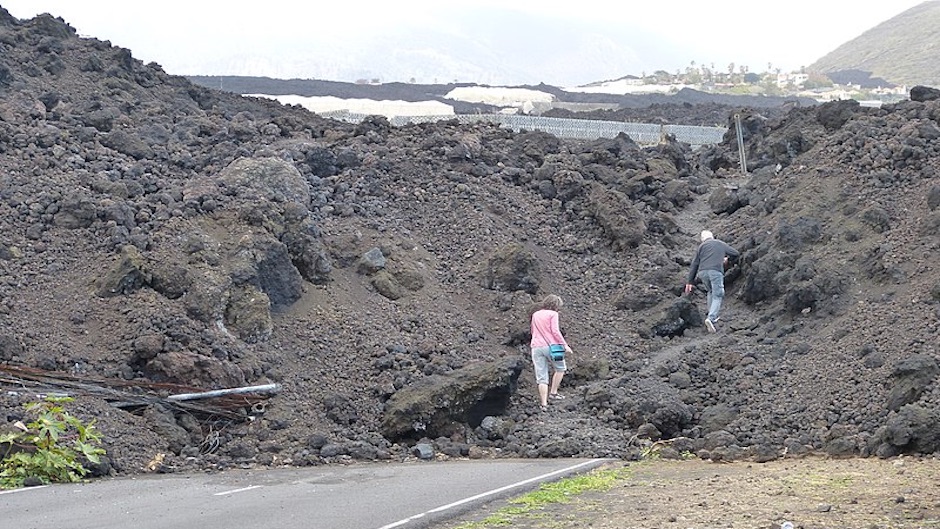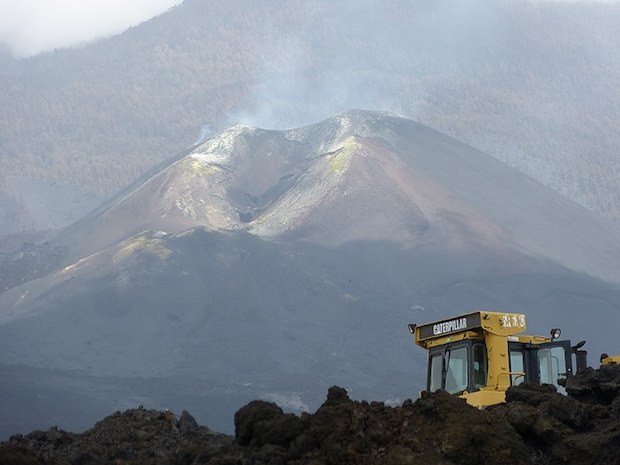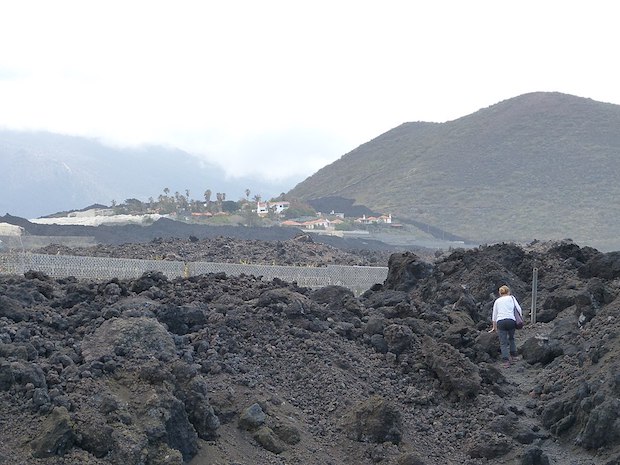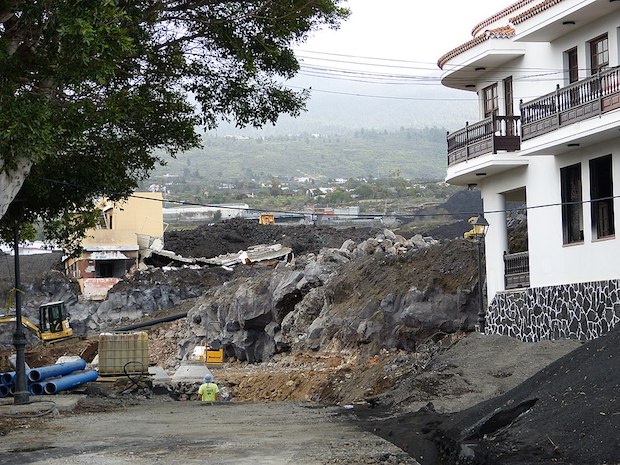Half a year after La Palma eruption: “Many are starting to accept it, but there is much pain”
A local Baptist pastor: “We support families with supermarket cards, food, rental subsides and fuel vouchers”. Rebuilding roads in the island is a priority as 500 people continue to stay in hotels.
Protestante Digital · LA PALMA · 01 JULY 2022 · 09:07 CET

Half a year has passed since the end of the volcanic eruption in the Cumbre Vieja natural park on the Spanish island of La Palma.
The Canary Island has undergone months of recovery from the natural catastrophe, which has has consequences of all kinds for the local families.
In a context of slow reconstruction of infrastructure and housing, and the distribution of aid previously announced by the state and regional governments, the local evangelical churches have been involved in the recovery process in a committed and creative way, expanding their scope of action and even creating a system of micro-credits for small businesses or distributing coupons to families for fuel.
Furthermore, there have also been “unique opportunities to share Jesus and people now appreciate us because we not only help them materially, but we listen to them”, points out Josué Santana, pastoral worker at the Evangelical Baptist Church of La Palma.
Spanish news website Protestante Digital talked to Santana about the distribution of aid, the current state of the island and the work carried out by the church.
Question. How is the situation now in La Palma?
Answer. Currently in La Palma we are in a time of reconstruction and trying to get back to normality, or something close to normality.
In the urban centres the ashes were removed a long time ago and people have returned to their routine, but in the area around the volcano, there are still tons of ashes and pyroclasts accumulated and houses buried.
The authorities have set up a plan to remove them and have hired many people from the island to do it, but it is so much work that they cannot cope with it. Until recently, groups of volunteers came to help families remove ashes from properties to start rebuilding or repairing their homes, but it is going to be a slow process.
Right now, the authorities are focusing on reopening the main roads that were cut by the lava to reconnect the cities and revive the businesses, shops and industries, especially banana plantations, that were cut off.
Many residents have been able to return to their homes, which the lava did not touch. Others can return to clean and repair, and only in the coastal area of La Bombilla and Puerto Naos the access to homes is not allowed due to the emission of toxic gases.
On the other hand, there are still around 500 people staying in hotels because it is impossible to find them a housing solution on the island, and they are waiting for the government to build new houses, or to buy and rent already built houses.
Finding reasonably priced housing is one of the main problems on the island right now, as speculation has driven prices higher than ever. Many have left the island searching for work or housing on other islands or on the mainland due to the lack of opportunities here.

Q. How is the population in general doing, and what is the mood on the island?
A. There is a mixture of everything. In general, I think that as a community we are starting to come to terms with the shock and to work to overcome the "mourning".
Many have lost not only their homes, but also their businesses, farms, livelihoods, jobs... And something that the people of La Palma value the most, which is their family memories, especially those who lived in areas close to the eruption and did not have an hour to collect their belongings.
Many families were in a state of shock for the first few months, unable to process what was happening, especially with the volcano active and in front of their eyes every day.
Now, months after it was extinguished, they are starting to look to the future, but there is still a lot of pain and open wounds.
Many of the users of the church's social services tell me that they have had to ask for psychological help. A woman told me last week that she still has nightmares about the volcano at night, and another girl told me that she suffers from post-traumatic anxiety.
There is a lot of work to do, both psychological and soul healing.
Q. What are the main challenges in La Palma now and in the short term?
A. I think that in the short term the challenge is to finish the road network, because this island, due to its orography, depends a lot on accessibility. We need good roads to reach in a short time areas that were isolated by the eruption, and now it takes two hours or more to get there.
This has led to businesses, restaurants, hotels and banana plantations having to close or reduce their production. There are many people on temporary lay-offs, and with the opening of the roads, economic activity will eventually resume, helping people to start again, have jobs and hope for the future.
The next step would be to remove the ashes from the Las Manchas area and help families who want to rebuild their homes.
Q. How is the aid promised by the government during the eruption doing?
A. The Canary Islands government opened a single registration office for those affected by the volcano from the very beginning. Around 7,000 people have signed up, and it closed on 24 June. This is the requirement for them to receive aid, both from municipal administrations, local government, the state, and the European Union.
Many donations have been made by individuals to administrations. The distribution has been criticised for being slow, but I believe that everything donated by private individuals was delivered months ago.
The city councils bought some houses, gave them to the families with the greatest priority or need, and they have started to build several prefabricated wooden houses, as well as announcing the construction of subsidised housing by the Canary Islands government.
The bad news is that all this is going very slowly, and in the meantime, some 500 victims have been staying in hotels since last September. It is a drama, especially for families who have children in schools on the other side of the island, who take hours to bring them there, or parents who work far away from the hotels.
Moreover, countless families are living in the flats of relatives, friends, etc. The family unit is the one that has suffered the most from this situation.
Some people even tell me that they live in caves or caravans because they can't find reasonably priced rents, or they have pets or farm animals to look after that they can't and won't leave behind.

Q. How is the church on the island dealing with this time of recovery?
A. The church, thank God, has not had to mourn any major losses of any of its members. We have felt from the first moment very protected and accompanied by the Lord, and with a hope that only He can give, in the midst of such a unique and dantesque situation.
Only a few of us, myself included, had to be evacuated from areas that were in danger or could be reached by lava. But this experience has helped us to appreciate more than ever the gift of life that God gives us, and above all the gift of his salvation.
As a church it is giving us a unique opportunity to witness and to help. Many churches from all over Spain and around the world have donated money to help the victims, and we have been distributing this aid since October last year.
It has been a huge job, as our church is rather modest, and we were not used to handling such a large flow of aid, let alone working with as many families as we do now.
Before, we used to help about 20 families with clothes, food and some household goods in our social service, while now the number of families we have registered in our registry is about 240, that is, about 700 people.
We have created a support system through vouchers and coupons. As a church, we decided that we were going to use all the money raised to put it back into La Palma society, investing in local businesses, many of them also affected directly or indirectly by the tragedy, and thus help to reactivate the economy of La Palma.
We have opened credit lines with supermarkets, shops, furniture and appliance shops on the island, where we saw the greatest need.
At the beginning of the crisis, many of us from the church participated as volunteers in the pavilion where the governmental aid was centralised, and we were able to meet many of the victims and their needs. That was the beginning of a relationship of trust.
Since they were able to return to their homes and return to their jobs, the needs have changed and we have adapted the aid to the new situations. Now we continue to support families with supermarket cards, food, clothes, household and other items, but we also help with renovation budgets.
As many have had to look for a new rented flat, we have also started to give rental subsidies, just for a few months, as well as fuel vouchers, especially to those who live far away or work in areas far from the flat they rented.
This is the help most frequently asked for due to the increase in fuel prices. In the last few months we have seen an increase in the number of families coming to us for help of all kinds. Every day we are open, we attend between 15 and 25 families, and it's non-stop.
The users are very grateful for the help we are giving. The church is gaining a huge and precious reputation on the island, and we are breaking down taboos and barriers that they always had with evangelicals.
Everyone gets a Bible as a gift, donated by the Spanish Bible Society, and many tell me they are reading it. There are unique opportunities to share Jesus in the midst of this whole process, and they appreciate us because we not only help them materially, but we listen to them, we let them vent their feelings.
Many need to talk, to express what they feel and tell what they have been through, and to receive a message of hope that no one else can give them, and that is appreciated by many of the people who come through the church.
Some have started coming to the worship services, and many personal and institutional relationships are being created. The positive thing that this very sad experience has brought about is that they are getting to know the evangelical church in La Palma.
They appreciate us as part of the community, and they are hearing about Jesus, which is the most important thing.

Q. Are there then more opportunities to preach the gospel now?
A. Now is when, paradoxically, people are more open to hearing about the gospel and Jesus.
People on this island are very Catholic in general, but there is also much superstition. They had a lot of prejudices against evangelicals, and now they see us as an active part of the community, as normal people like them, who try to help in a sincere and honest way, which they have not seen in other institutions.
Many complained at the beginning about how God could allow this to happen, and it happened to them, but the message we tried to give from the beginning is that in the midst of the disaster, they did not have to grieve for human loss, and they still had their lives. That life is a gift from God, and he has a purpose for it, even if we don't understand it because of our circumstances.
This has made them think of a different dimension of life, beyond their jobs, their belongings and to give importance to the transcendental.
Seeing the hope and calmness with which the church's victims faced the crisis was also an opportunity to teach them a different vision of life, and there have been and are opportunities every day to talk to them about that Jesus who urges us to get up, start again and help those around us.
I sincerely believe that with the Lord's help this time will be a time of witness on the island and of conversions, of many people asking themselves what they are doing with their lives and how they need Christ in them.
Q. What are the needs and how can we help now?
A. Above all we need the prayers of all the churches. We need a lot of wisdom to know how to invest the money, which families to prioritise and to be fair in the distribution.
Every day we have to make decisions that would make Solomon himself tremble. We want to help everyone, but we know that resources are limited and will run out, and we don't want anyone to be left behind. But with the Lord's help we are being a great blessing.
If people want to continue to help financially, they can continue to do so both to the church account and to the Evangelical Council of the Canary Islands, but above all we need prayer and that the members of the church remain committed, even more each day to this work that God has put before us.
We keep receiving requests from church groups who want to come and help, and we are very grateful for that, but the problem is that we have no facilities to host them, so if any group or church wants to come and help, unfortunately it will have to be at a later date, when we have a place to host them again.
Published in: Evangelical Focus - europe - Half a year after La Palma eruption: “Many are starting to accept it, but there is much pain”
Since you are here…
Evangelical Focus is a news and opinion platform that brings together Christians from across Europe and other parts of the world. We need the support of our readers to make this media project sustainable in the long term. You can support our work! Read about Evangelical Focus’s sustainability here.
Would you like to support the work of Evangelical Focus?
Use one of these methods. You can also transfer your donation to “Areópago Protestante / Evangelical Focus” IBAN: ES8521000853530200278394 (Swift / BIC: CAIXESBBXXX). Subject: “Donation Evangelical Focus”
